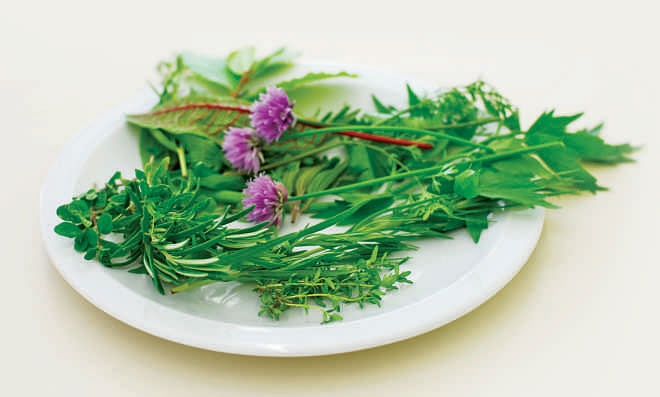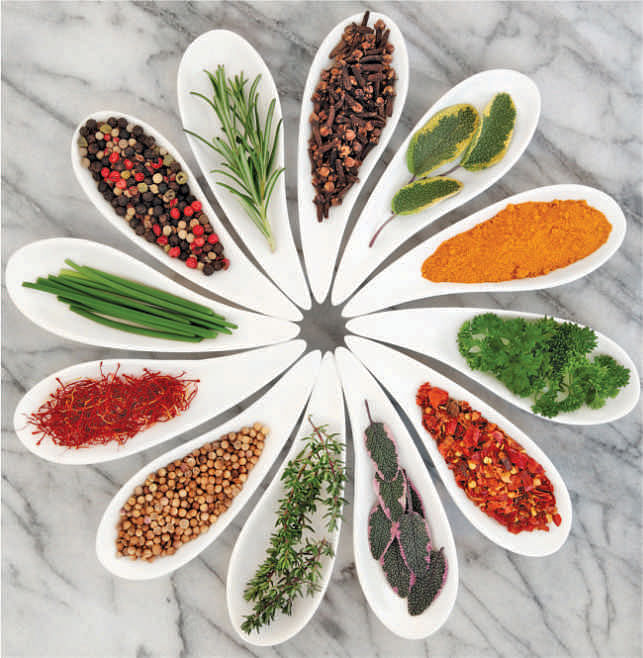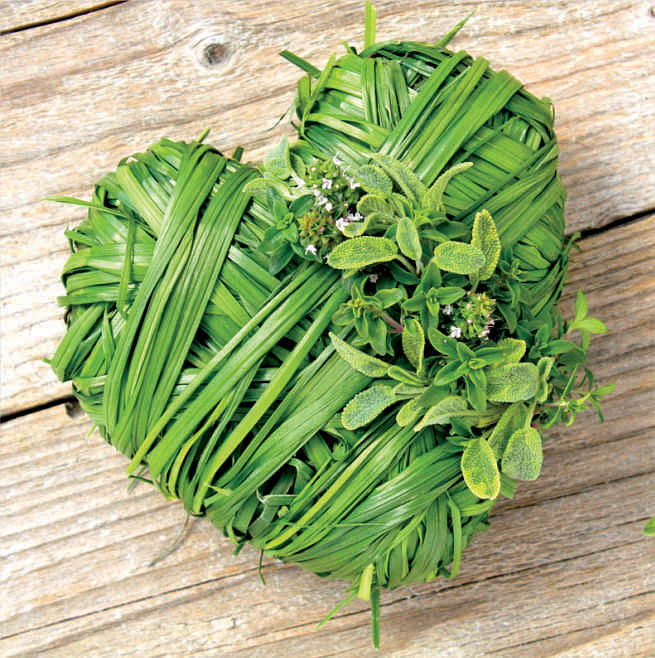HERBS

Healthy food is often criticised for being deficient in terms of taste and consumers are frequently unaware of the numerous health benefits that these foods possess. The multiple uses of different herbs and spices however, can be utilised to their full potential without compromising on taste. Incorporate these into everyday foods and beverages and let them work their magic! Read on for our list of how to include remedial herbs and spices into your normal food and lifestyle regimes to exploit their full gamut of benefits:
Ginger(Ada) - prevents nausea
Ginger prevents nausea, be it in the form of ginger ale, tea or even raw. Ginger promotes the secretion of various enzymes that help neutralise stomach acid.
Direction: Wash the ginger well and peel it. Slice it into small pieces; boil 2-3 cups of water over medium high heat and add the ginger, letting it boil fo 3-5 minutes. Remove from the heat and strain if you like or pour everything into your mug. Add honey if you prefer. Sip slowly and relax.
Black tea leaves - reduces heart problems
It is believed that polyphenols in tea help prevent atherosclerosis, a condition where fatty deposits cause narrowing of arteries. Polyphenols in tea have a mild anti-inflammatory action in animal studies. Polyphenols may reduce the activity of platelets which are clotting agents of the blood.
Direction: A couple of cups of black tea a day is a good amount, and the caffeinel helps you start alert throughout the day.

Chamomile - helps sleep
Few scientific studies have been done on chamomile's ability to encourage sleep. Those who are suffering from insomnia may benefit from drinking chamomile tea just 30-45 minutes before bed. The chemical in chamomile tea that fights insomnia is called chrysin. The compound helps alleviate anxiety, relax muscles and induce a deeper and more refreshing sleep.
Nettle(Bichuti) - treats dandruff
Stinging nettle has a number of recognised medical properties including those that are anti-inflammatory. It is used as a natural medication for dandruff. Massage your scalp with coconut oil infused with nettle leaves leaving it overnight. It is a very effective treatment for dandruff. Also, juice extracted from nettle leaves massaged on the scalp helps treat dandruff.
Ginseng - provides energy
Ginseng tea provides energy throughout the day by stimulating the brain, improves concentration and thinking power. Ginseng tea is known for the cooling effects it has on the body and also minimises stomach pain, menstrual cramps and generalised discomfort associated with menstruation.
Fennel seeds(Mauri bija) - digestive aid
Fennel seeds have shown results as a relief agent for bloating and constipation. Maintaining the recommended Dv of fibre can help prevent constipation, cleanse the body's digestive system, and aid the stomach in the formation of bile and other digestive juices. Chewing fennel seeds after meals is believed to be a great way to aid in digestion.
Mint - soothes an upset stomach
Try mint tea. It is a great natural remedy for certain stomach ailments, including bloating and gas. Having a cup of tea before bed can help soothe these problems and make food easier to digest. It is a strong cure for stomach aches, also used for relaxation.
Cinnamon(Daruchini) - controls blood sugar
Numerous studies show how cinnamon regulates blood sugar making it a great choice for diabetics and hypoglycemics alike. It also reduces LDL cholesterol levels. This may in turn reduce the risk of cardiovascular disease. It can be added to a variety of foods and beverages and can be purchased in capsules for higher concentration.

Eucalyptus - relieves lung congestion
Eucalyptus is used to treat lung problems. It opens the lungs and helps in breathing. It also clears clogged nasal passages and bronchial congestion. Eucalyptus is one of the best known cold remedies and eucalyptus oil can be used as vapour rub. Eucalyptus leaves can also be taken in tea or used in steam inhalations.
Parsley - fights halitosis
Halitosis also known as bad breath, can happen due to many reasons like bacteria that builds up on the back of your tongue or between the teeth. Parsley is packed with vitamins and has more particular uses, such as treating bad breath. You can consume it in your food, by itself or even blend it in a drink. Dip a handful of fresh parsley leaves in vinegar and chew them thoroughly for a minute or two. This will also aid digestion.
Licorice(Jastimadhu) - soothes a sore throat
Licorice roots are a great natural remedy for sore throats. The natural chemicals within licorice roots are said to reduce swelling and relieve coughs. Take some licorice roots and boil them with water to make licorice tea. Strain and have it to soothe your throat. You can also add licorice powder to tea or add the powder to water while gargling.
Lavender - eases tension
Lavender oil is safe and effective on treating tension. It will help you to cope with stress and help to boost your mood. Massaging the oil is one of the best ways to calm the mind and release muscular aches and pain. You can also add a few drops of oil in a warm bath. Lavender leaves can also be added to tea.
St.John's Wort - helps fight depression
St. John's Wort has yellow flowers and it is known as a weed. It has been used to treat mild depression. It is more like a healing herb. It improves moods and decreases anxiety and insomnia related to depression. It is as effective in treating depression as many prescription drugs. You should be aware of allergies while consuming it. St. John's Wort is generally safe, but do not forget to consult a specialist.
Calendula - prevents wound infection
Calendula is also known as pot marigold or garden marigold. Calendula oil is easy to prepare and has many uses. The gentle soothing and healing oil is best for cradle cap, diaper rashes, chapped skin, bruises etc. It is a useful and versatile product to keep in a first aid box to treat cuts, abrasion, chapped lips etc.
Comfrey - allivates dry skin
Comfrey is known by different names in different parts of the world. Comfrey has multiple uses such as curing diseases, maintaining health and also healing wounds. The herb can cure many medical conditions. Comfrey contains phosphorus and calcium, which makes the bones and teeth strong. The pepsin present in the herb encourages good digestion.
Rosemary - improves memory
There have been studies that prove rosemary can enhance one's memory, due to eucalyptol found in the herb. Eucalyptol plays an important role in the development of memories. Rosemary oil enhances the memory as its aroma contains terpenes, a primary component of essential oils. You can also make a concentration blend. Add 20 drops of oil, 6 drops of basil, 2 drops of rosemary. Mix the oils then diffuse it into the air.
Passion flower - reduces anxiety
Passion flower extracts are used to treat anxiety. Passion flowers are available as infusion, teas and liquid extracts. Passion flower is a well researched herb recommending its use for nervous restlessness, sleep disorder, nervous stress etc.
Tobacco - treats bee stings
As we know tobacco is bad for health, but it does have lot of benefits as well. As soon as you get a honey bee sting, get a packet of tobacco to apply to the sting. Break the cigarette into half and take out the tobacco. Take the tobacco and apply it on the affected area. Hold it against the sting until the swelling and pain ward off.
Sage - fights Alzheimer's
Sage has many positive effects on those who are suffering from neurological disorders like Alzheimer's disease. Sage leaves are also used as culinary spices and as a source of sage oil. Sage oil has a number of non-cosmetic medical uses in antifungal, antibacterial and digestive remedies.
Chrysanthemum - fights cold
Chrysanthemum tea is an ideal drink to treat sore throats, redness in the eye, itchiness in the eye etc. It also helps, when taken with lunch or dinner, to ease digestion. Chrysanthemum tea is obtained from dried chrysanthemum flowers. It is easy to make; just add hot water in 3 grams of dried chrysanthemum flowers and soak it for 5 minutes.

 For all latest news, follow The Daily Star's Google News channel.
For all latest news, follow The Daily Star's Google News channel. 



Comments